The following debate took place in New York City in January 1997 at the home of Michael Marsh.
Stephen Batchelor lives in England and is the Director of Studies at the Sharpham College for Buddhist Studies and Contemporary Inquiry. He is the translator of Shantideva’s A Guide to the Bodhisattva’s Way of Life, as well as the author of several books, including the recently published Buddhism Without Beliefs (Riverhead). He was the leader for the Tricycle Dharma Talk, Buddhism for This One and Only Life.
Robert Thurman is the Jey Tsong Khapa Professor of Indo-Tibetan Studies at Columbia University and a cofounder of Tibet House, New York; his translations include The Tibetan Book of the Dead and works by Vimalikirti and Tsongkapa. Both Batchelor and Thurman are longtime Buddhist practitioners and former monks in the Gelugpa order of Tibetan Buddhism.
In the dialogue, “Tricycle” represents questions and comments put forth by those present at the debate—staff members Helen Tworkov, Mary Talbot, and Lorraine Kisly, as well as Michael Marsh, Pico Iyer, and Mark Epstein. Photographs by Sally Boon.
Tricycle: The question that we’re here to debate is the role of reincarnation in Buddhism. According to tradition, reincarnation is pivotal to the Buddhist path. Among Westerners, this is under dispute.
Thurman: Anyone has the right to be a Buddhist, no matter what they believe. Still, I would maintain that in order to make the kind of evolutionary progress that the Buddha wanted people to make, you would have to be responsible for the sequence of former and future lives.
Tricycle: Stephen?
Batchelor: I suppose I would say no.
Thurman: That’s a relief! Now we have something to talk about! [Laughter]
Batchelor: But does evolutionary progress have to be predicated on personal continuity? Could you not speak of it in terms of, let’s say, a communal, cultural, or social continuity that we are part of in terms of the Buddhist tradition as we’ve inherited it over the last two-and-a-half-thousand years? Why does it have to be isolated within individual persons?
Thurman: Well, it doesn’t have to be. But the Buddha’s discovery was that it is. If you die without becoming a Buddha, and you have no more opportunity to become a Buddha, how would you share in somebody else’s achievement of Buddhahood at some other time?
Batchelor: Wouldn’t my contribution be what I can do in this life? And then my legacy to future lives would be what I have managed to achieve now, through my work, through the effect I might have had on others now, or on subsequent generations? There may be past lives in common—I’m not saying that they’re not there—I just don’t know.
Thurman: Buddhahood is defined as the fulfillment of self-interest as well as other-interest. And if our lives are just within the parameters of being a coarse body and a coarse mind, whose final destiny is nothing, than the restraint from doing negative things is not that great really—which is the problem with ethics in materialist societies.
Related: Dropping the Bodhisattva Gods
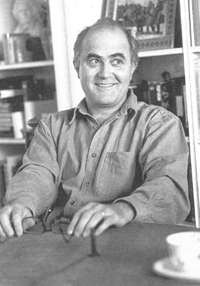
Batchelor: I did believe very literally in rebirth when I was training as a Tibetan Buddhist monk. But I used to ask myself, if there were no rebirth, would I behave differently? And the answer is no. Rebirth was never actually a driving force. Is it for you?
Thurman: Yeah, I’d act differently. I’d relax a lot I think! Definitely.
Batchelor: Really?
Thurman: I would lose my focus as a completely unrepentant workaholic. The fact that there would be nothingness awaiting—that’s like negative nirvana.
Batchelor: That’s not my position. To believe that there is nothing after death is just as much a view as believing there is something.
Thurman: I agree with you. But isn’t that the materialist belief?
Batchelor: I would certainly not take the stance that after death there is nothing. The only honest position I can arrive at is: “I actually don’t know.” There could be possibilities after death that this current mind/body complex could not ever conceive. Theories of rebirth may actually constrain the mystery and the potentially extraordinary and inconceivable possibilities of what happens after death into the frame of what can be logically conceived of through this very limited human organism. To me death is not just a question of either continuity or nothing. They are two options that the human brain can conceive of because of our either/or logic. So the only position I can adopt is, “I really don’t know.” Not “don’t know” in a skeptical, superficial “don’t care” way. Not at all. I would much prefer to believe in rebirth. As you say, it offers a very attractive evolutionary perspective. But in all honesty, I see neither logical proof nor empirical evidence, and after all, the Buddha did suggest that we check these things out for ourselves.
Thurman: Have you never read Professor Ian Stevenson’s many accounts? [See Children Who Remember Previous Lives. Charlottesville: University of Virginia, 1987, a compilation of case studies of children who claim to remember past lives.] The most outstanding is about the boy in Sri Lanka who was born with a birthmark on his neck. As soon as he could speak, he said that he was the brother of his father. The parents tried to shut him up; they had moved to a different county because as the brother of his father he had murdered his fiancée in his previous life and had been hanged. And he had died with an indelible sense of guilt and anguish. But when that boy grew up he went back to the other county and spent his life in voluntary bondage to the family of that fiancée. And in that culture, he doesn’t get on the David Letterman Show, he gets nothing out of it, and the family had every reason to suppress the memory. But he knew all the details and it was documented by Stevenson. There are many such stories.
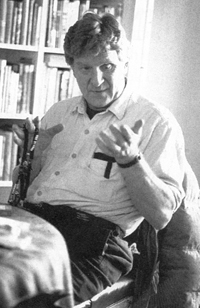
Batchelor: Stevenson investigated something like 1,700 cases in the course of his life, of which I think he says that there are forty-seven that he cannot explain by any other means than by past and future lives, and I agree with you that that’s evidence.
Thurman: Then there is the evidence of great figures in Buddhist history who claim to have remembered former lives—concretely. We can say they’re all deluded. We can dispute it and discredit it, but we can’t say it’s not evidence.
Batchelor: I accept that; that’s why I would hold an agnostic view—because that to me is persuasive. Nonetheless, it’s an unacceptable leap to go from those very small number of cases, to then concluding that rebirth is a fact that will occur to all beings. It’s inductive logic to draw general conclusions from specific, isolated instances. We know, for example, that there were schools in ancient India, and some Tibetan texts, that refer to two or three lives, then nothing. One could use that same evidence with these children to say that it demonstrates that there is a possibility of consciousness moving from one life to the other. But you cannot draw any inference about its being a process that goes on until you are a Buddha. It’s not proof, in any sense of the word, that therefore that will happen to all other people; or even to that person ever again. But let’s imagine that we do come up with a scientific acceptance of reincarnation. It doesn’t serve to indicate the more central issue: that of karmic continuity and consequences of one’s moral acts. One could hypothesize rebirth without having any further evidence as to a person being born according to the nature of the acts that they committed in the previous life. And that is surely the crucial element. Stevenson’s cases don’t suggest any kind of moral implication.
Thurman: What does “moral” mean? A man murdered somebody in that case; he had a birthmark from the hangman’s noose, and he was completely driven and gripped with guilt for it.
Batchelor: But then, according to Buddhist theory, it’s unlikely that he would have been born as a human being.
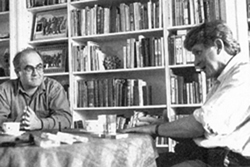
Thurman: Not necessarily. In this case, he somehow hung on to his good karma of being a human—you can rationalize anything in Buddhist theory! All this stuff we’ve heard about evidence and science is all a bunch of rationalizations anyway. Nobody ever took hold of an atom, or a quark, or a neuron or a neutron or solar big bangs.
Batchelor: Well, I’m not so sure that science is just rationalization. It’s being able to produce hypotheses that are testable under repeated circumstances anywhere in the world.
Thurman: Stephen, if everything after death is inconceivable to our human senses, then you are presumably discounting the Buddhist claim that a Buddha has senses that are adequate to comprehending the nature of reality utterly, beyond the human capacity. And also discounting the claim that Buddha has omniscience. Since Buddhists trust that, they also consider the Buddha’s report about the nature of former and future lives to be highly reliable.
Batchelor: I’m not discrediting those claims. I’m questioning them.
Thurman: As you know, the only definitive teaching in the canon is Buddha’s teaching of shunyata, voidness. But the texts say that the Buddha is a credible witness of former and future lives because he has already proven to you the state of shunyata, which you can actually experience, and which can actually be proven. Because the only thing rigorously provable is voidness, the teaching of former and future lives is open to interpretation. That doesn’t mean it’s untrue, only that it’s not as absolute as the teaching of shunyata. So, are you disappointed in shunyata? I don’t think so.
Batchelor: I have no trouble with that at all.
Thurman: Since that was proved to you, and since Buddha was the only one who taught that in history, then he has a more credible claim to understanding the nature of reality more accurately than anybody else.
Batchelor: Again I find that a difficult inference to draw. Just because a person is able to demonstrate one thing with absolute clarity—
Thurman: But that’s the fundamental thing. The nature of reality isn’t just one thing, it’s the main thing.
Batchelor: I agree. And for that very reason, the other issues are not so important to me.
Thurman: Well, that’s true. They aren’t. That’s why I conceded when we started this debate that you can be a Buddhist without believing in this.
Tricycle: But you said that you couldn’t attain realization with believing in it.
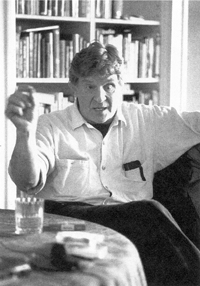
Thurman: Yes. Evolutionary progress.
Tricycle: So you’re still locating a belief in rebirth as a central tenet on which the Buddhist view rests?
Thurman: That’s how it’s traditionally defined in Buddhism: belief in the existence of enlightenment and belief in the cause and effect of karma.
Batchelor: Not rebirth.
Thurman: C’mon now! They mean rebirth. That means that causality is coherent and cohesive and you’re hooked into it; you can’t be disconnected.
Tricycle: So, Bob, you can’t have cause and effect and karma without rebirth?
Thurman: No, because you’re not in it.
Tricycle: And Stephen, what would you say?
Batchelor: I think you can. For me one of the most striking passages in Shantideva is the verse in which Shantideva says that the person who dies, and the person who is reborn, are other. And, therefore, the only valid motive that one can have for acting has to be compassion. There is no “you” who continues into a future life. “You” finish at death, and something else, another being is then born, like a parent giving birth to a child. That position takes the subject—me, the ego—out of the equation. The process of evolutionary change is not about me, Stephen Batchelor, but about what I can now do to improve the spiritual evolutionary advantage of those who come after my death. If you take the idea of otherness in this way, you no longer need to posit some personal consciousness that goes from one life to the next.
Thurman: You don’t consider that verse to be a denial of that, do you ?
Batchelor: It’s not a denial, but Shantideva is seriously questioning what it is that continues.
Tricycle: Stephen, how do you explain so many of the Buddhist masters, starting with Shakyamuni, talking about their past lives?
Batchelor: My own sense is that the Buddha took on board the cosmology and the cycle of rebirth that was already in place—at least in principal—in India at this time. That was the cultural paradigm that he inhabited.
Tricycle: So rather than attribute to him supernormal human capacities, you, Stephen, are attributing to him limited cultural parameters.
Batchelor: I have difficulty with the idea of seeing the Buddha as a kind of superman.
Tricycle: Bob?
Thurman: I’m sure Buddha was superman! Beyond superman! [Laughter] Stephen is correct that the Buddha accepted his cultural paradigm. Yet many of Stevenson’s cases are drawn from cultures other than India where they don’t have formal rebirth theories. The vast majority of people in this country, when they’re polled, believe in heaven and hell. What we have in our culture is an elite group controlling materialist science. Their views make it impossible for people to make progress, because it inculcates a nihilistic attitude about life. “Existential” is a nicer term, but it’s really nihilistic. It gives you a weird kind of freedom. And it gives you a tremendous helplessness. There’s is nothing you can really do because you don’t think that this piece of meditation, this piece of training, this piece of reasoning, will really accomplish any transformation. The idea that you will become nothing at death, which subliminally makes you feel like nothing even now, is the major obstacle to people’s emotional life, and their sense of connectedness with nature, with other people, and the environment. And that’s where the cause and effect of karma and former and future lives, can push at those self-imposed boundaries.
Related: Talking Tibetan Politics, Superheroes, and Future Dalai Lamas with Robert Thurman
Tricycle: So the “story” of rebirth can be a positive motivating force.
Thurman: And that’s good. The key boundary that we have to cross is the white, Protestant mentality in order to rediscover the sense of reconnectedness to life and the planet. But don’t get me wrong. I’m not saying that the Buddha was just telling stories in some sense of making it up. Of course, from the Buddhist radical scientific point of view, the story of us sitting in this room on the eighteenth floor of a building in New York City is a story.
Batchelor: You seem to hold the view that if one believes that there is nothing after death one cannot believe in causal or moral or transformative processes.
Thurman: Well, no, I didn’t say that.
Batchelor: It was implied, no?
Thurman: That would be the extreme case. That would be like Raskolnikov, the absolute nihilist.
Batchelor: Or Jean Paul Sartre. But a lot of what you just argued was premised on a link between a materialist/nihilist view thereby undermining people’s sense that there is anything they can really do. I don’t think that follows.
Thurman: I didn’t mean that it followed on a conscious level. What I’ve noticed is that the seed of a little picture that someone holds, even subliminally, in their minds, planted by their materialistic education, that at death, Boom! Finished! That little seed, subliminally, erodes the sense of connectedness. It corresponds to an ingrained sense of disconnectedness and an atomistic individualism that has been cooked up over the last three centuries in the West. It doesn’t mean that people can’t simultaneously hold theories of causality. But I have come perceive that seed to be intimately connected with this almost psychotic dimension in the Western personality.
Batchelor: I certainly agree with you that it is essential for people to have a world-view that establishes their deeper sense of connectedness with the environment, the world, with other people and society. And I agree that many of the disasters that the world is currently experiencing is because of either that nihilistic or that absolutistic view. And I agree that for many people it is very liberating to have a view of individual continuity without lapsing into either absolutistic or nihilistic extremes. But I don’t feel that view is necessarily true. I feel that one can account for transformation, responsibility and causality quite adequately without having to ascribe to a metaphysics of personal continuity.
Thurman: Let me ask you then: we cannot perceive or conceive of anything that lacks continuity in nature. Why should we then take the subtlest level of consciousness and say particularly that that has no continuity?
Batchelor: I don’t dispute continuity at all. Of course there’s continuity. The question is how does continuity continue? A tree continues, but that tree in Central Park will disappear, and some seed, acorn, will carry on the genetic information.
Thurman: So you agree with the continuity of consciousness then. It’s just that you think that it may not be subjectively apprehendable by anybody.
Batchelor: I don’t necessarily agree with the continuity of consciousness. I believe in the continuity of actions.
Thurman: The consequences of actions; to the recipients of the actions, not to the actor.
Batchelor: Not necessarily to the actor, no.
Thurman: So something gets excluded. That’s what I’m trying to say: why should one thing be excluded from this vast sea of continuity?
Batchelor: Because consciousness is contingent upon this physical organism. What we are saying when we posit no future life for the individual is that that particular piece of process of continuity of me remembering myself as I go along—with the gaps that come from sleep, from meditative states, from momentary amnesiacs, and other things—that particular continuity is one that stops.
Thurman: In classical Mahayana and Tantric accounts when someone attains Buddhahood they go through a kind of mega-death which results in a kind of mega-life where they can be alive in fifty different beings or a million different beings. That’s very different from a person who as a compulsive self-centered, self-enclosed individual grasps for another self-enclosed individual’s existence in whatever form of embodiment, which is the way they would describe an unenlightened person’s involuntary samsaric rebirth—driven by lust and hate and so forth. So there are different kinds of rebirth within that picture. But no one can absolutely prove rebirth; even the Buddhists say that; only a Buddha’s mind can know it for sure. But still, the fact of accepting it has profound and important consequences.
Tricycle: From a pragmatic view?
Thurman: All Buddhism is pragmatic.
Tricycle: It’s useful to help people?
Thurman: That’s in keeping with the tradition.
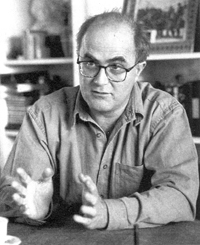
Tricycle: The creation myth in Christianity is also very pragmatic.
Thurman: Yes. But that claim beyond myth is not plausible to me because God didn’t teach voidness and since he didn’t teach voidness then he can’t prove his version of reality to me. Buddha taught voidness and that did prove itself to me.
Tricycle: Bob, in your view the rebirth story is very useful and it’s very pragmatic, but you are talking about it in a way that undermines the possibility of its “reality.”
Thurman: In a sense the only absolute reality is voidness. Buddhism is actually more scientific in the way Western empirical science understands itself. Accounts are always open for revision because voidness is a self-deconstructing account. There is no absolute truth other than that there is no absolute truth. In a way, that’s what voidness means. So that relativizes it.
Tricycle: If you accept that Buddhism is about suffering and the relief of suffering then the question to you, Bob, is why, without rebirth, you would then change some part of your life? And the question to Stephen is, does the vow to relieve suffering become greater or lesser with a dependency on rebirth? Is there a way in which the dependency actually could subtract or undermine?
Batchelor: It could go both ways. I think that for people who are inspired by the notion of subsequent lives it could reinforce the vow to save all beings. But there could also be those who could feel, “Well, you know, this life is kind of busy. Maybe in some future life I’ll get my act together.” I don’t think that there’s anything to believing one way or the other that has any intrinsic ethical implications.
Thurman: But, Stephen, how can you vow to save all beings if you only have another fifteen years or eleven minutes? What does it mean to say it then?
Batchelor: What does it mean to say it anyway?
Thurman: If you have an endless amount of time, it means that’s going to be your orientation over that endless amount of time.
Batchelor: But why would you slow down now, Bob? You’ve got a lot of work to do to save all sentient beings. The implication of what you’re saying is that if you didn’t believe in future lives…
Thurman: That’s right. The vow becomes unrealistic, completely unrealistic, and says nothing.
Tricycle: But is it really more “realistic” if you have ten lives?
Thurman: Definitely. Absolutely. Not ten. Endless, because all beings are endless. In your Zen centers they say, “Beings are numberless, I vow to save them all.” You say that all the time, and what does it mean if you’re living at one moment and the next you’re dead and buried in New Jersey?
Batchelor: That’s a very literal interpretation of that vow. I’m inspired by that vow but not because of its literal implications.
Thurman: Then you’re not literally taking the vow. You have to save all the beings! You have to save me! You’d better! You can’t abandon even me. And if you don’t mean that, you’re not taking the vow.
Batchelor: That’s certainly one way one could interpret it, but I would see it as an expression of a total commitment. In the language of those times, that’s the most total expression, or total metaphor that you could come up with for articulating that passion.
Thurman: But can you genuinely articulate it if you are doing it right along with the belief that it is impossible and can’t be done? If you don’t think you have endless time to do this—or at least quite a long time, then you’re not taking the vow.
Batchelor: It’s very difficult to take that literally because if beings are numberless then it’s a project that you will be engaged on forever.
Thurman: Do you take anything literally?
Batchelor: I take the teachings on shunyata literally.
Thurman: And you take New York City literally, and the street, and up and down, and life and death. You take some things literally although you know they’re also only relative not absolute realities.
Batchelor: Yes, of course.
Thurman: So why would you exclude those imaginative possibilities?
Batchelor: For a start, it falls out of the range of my own experience, so I have to say that I cannot confirm or disconfirm those descriptions.
Thurman: Okay, agreed.
Batchelor: I think the great challenge for us is to come up with something comparable in imaginative power but one that does not require us to simply replicate the unique imaginative expressions of the past.
Tricycle: But isn’t that searching for another useful story to make us feel a little bit better?
Batchelor: There is an element of that. I think a lot of these teachings perhaps do begin with stories of consolation. The difference is between a story of consolation that posits something fantastical—like New Age groups believing that there are space ships waiting to take up those who believe in them, or whatever—and theories of consolation that are a first step towards an actual practice that can begin to change not only your ideas or your beliefs but actually begin to change your whole sense of who you are in this world. And Buddhism certainly is concerned with presenting a path, a way of being, that literally changes your obsession with isolation and leads you to an understanding that your uniqueness is something built up not on a metaphysical basis of some stuff that’s distinct to you, but upon the unrepeatable matrix of circumstances and conditions that has generated your being.
To me one of the great insights of the Madhyamaka philosophers is how the individuality of a person does not contradict the emptiness of any separate nugget that defines that person; but individuality is the consequence of relationship, of what you and your parents have done, such that in this particular moment you are constellated in this particular way. Now, we sometimes take that individuality and see that as a ground for affirming some sort of isolated selfhood. That would be the illusion that the Buddhist teaching would seek to undermine. And that leads to the possibility of transformation, both individually as well as socially, and hopefully, in Bob’s language, a new vista on the evolutionary possibilities of humankind.
Thurman: It sure would.
Tricycle: And this can be done without taking responsibility for past and future lives?
Batchelor: I believe so.
Thurman: Although you have conceded that you have to adopt a virtual past and future agenda of some sort. So in a way you posit a virtual continuity and connectedness, if not the literal former and future life one.
Batchelor: I think “virtual” is actually quite a good term.
Tricycle: You disagree on what continues. But there’s been no difference in your views on the fact of continuity. Is that correct?
Batchelor: One way one could put it is: I would try to behave as if there were infinite lifetimes in which I would be committed to saving beings.